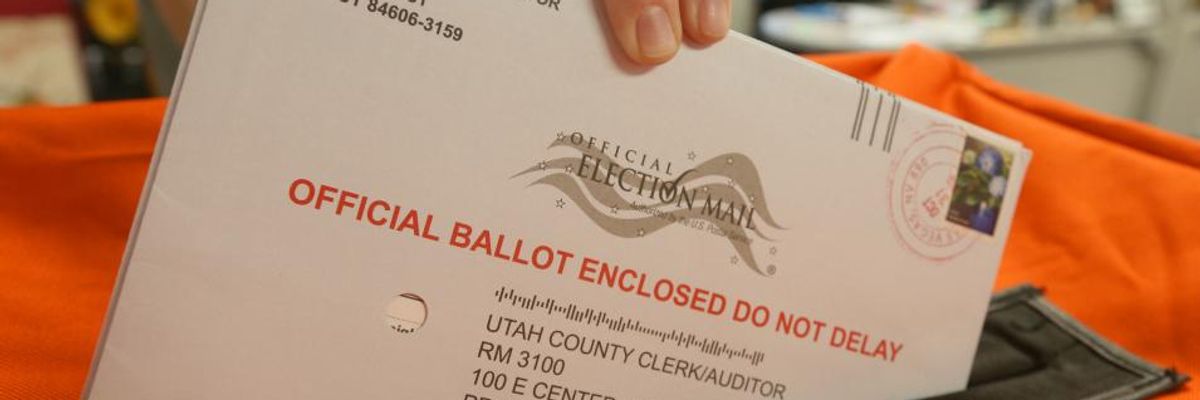Shortly before Wisconsin on Monday announced the results of elections that were held last week despite safety concerns about the ongoing coronavirus pandemic, a coalition of over 150 advocacy groups issued a demand that Congress provide at least $4 billion in funding to help states safeguard future voting in the midst of the public health crisis.
In a letter led by the Leadership Conference on Civil and Human Rights, the organizations warned that "time is of the essence" and argued that "the election fiasco in Wisconsin--where voters were forced to risk their health and safety in order to exercise their fundamental right to vote--underscored the tremendous need to provide additional assistance to states during this dangerous and challenging time."
The groups previously requested $2 billion for election assistance based on experts' estimates, but that initial figure was based only on general election needs, the letter explained. Now that primaries--except Wisconsin's--have also been delayed, "additional funding is needed to ensure that each state can provide a comprehensive approach that includes both vote-by-mail and in-person options safely and effectively."
The $400 million in election assistance in Congress' last coronavirus relief package was "a step in the right direction" but "will defray only a fraction of the costs associated with implementing the necessary adjustments to safeguard the electoral process," the letter read. "In its next package, Congress must provide at least an additional $3.6 billion to help states prepare for 2020 elections amidst the COVID-19 crisis."
The groups also encouraged federal lawmakers "to institute accountability measures that provide latitude to states while ensuring that the funds are being directly used to ameliorate the impact of the pandemic on voting access," citing a March 17 letter from over 200 groups about essential election administration policies for the virus outbreak.
"We urge you to take the additional necessary steps during your next legislative efforts to address the COVID-19 pandemic to ensure that no citizen is left out as we work together to protect the country and safeguard our democracy."
--150+ groups
The letter called vote-by-mail "necessary but insufficient alone to safeguard our elections," outlining hurdles faced by Native American voters living on tribal lands, communities of color, and people with disabilities as well as related language access and literacy issues. The groups emphasized that lawmakers must also protect people who seek out in-person voting options.
"We urge you to take the additional necessary steps during your next legislative efforts to address the COVID-19 pandemic," the letter to Congress concluded, "to ensure that no citizen is left out as we work together to protect the country and safeguard our democracy."
Signatories included the Brennan Center for Justice at New York University Law School, Citizens for Responsibility and Ethics in Washington (CREW), Common Cause, Demand Progress, Earthjustice, the Economic Policy Institute (EPI), Greenpeace USA, Human Rights Campaign, the NAACP, Peace Action, Planned Parenthood Action Fund, Public Citizen, and Sierra Club.
Calls for Congress to take more steps to protect future 2020 elections have ramped up since Wisconsin's state Supreme Court and Republican legislative leaders defied public health warnings by forcing in-person voting on April 7 and blocking the extension of the deadline to return absentee ballots, which critics decried as a "civic catastrophe" and blatant voter suppression.
Many political observers believed the GOP effort in Wisconsin partly aimed to quash Jill Karofsky's ultimately successful challenge to Justice Daniel Kelly, a right-wing incumbent on the state Supreme Court who was backed by President Donald Trump.
Journalist Ari Berman, who has reported extensively on voting rights, said on MSNBC over the weekend that the election in Wisconsin was "one of the worst elections in modern American history."
Some federal lawmakers, such as Rep. Ilhan Omar (D-Minn.), have voiced their support for enhanced efforts to protect voters in light of the coronavirus crisis. The congresswoman tweeted Tuesday that "nationwide #VoteByMail will save democracy and save lives."
The ACLU has also sent a series of letters to Congress, demanding federal requirements that all states "offer no-excuse mail-in absentee voting to every eligible voter" and "institute a minimum early in-person voting period of 14 days, including at least one Saturday and one Sunday." The group has called for $4 billion in federal funding for states, counties, and municipalities as well as $4 million for the U.S. Election Assistance Commission.
"The coronavirus shouldn't be a political issue, and it's clear that the pandemic is impacting our elections. The longer Congress waits to act, the greater the risk to both voters and our nation's election workers," ACLU senior legislative counsel Sonia Gill said in a statement last week. "Early turnout numbers from Milwaukee show a massive drop in turnout, from over 167,000 in 2016 to between 75,000 and 115,000 this year."
Despite mounting public pressure on federal lawmakers to urgently pass a fourth coronavirus relief package--as widespread shutdowns persist and an "absolutely staggering" number of Americans apply for unemployment benefits--legislative progress has stalled since last week. Trump, meanwhile, has continued his baseless attacks on mail-in voting.

